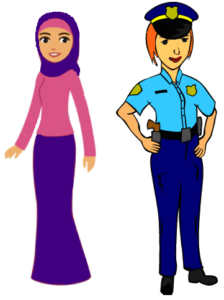July 6, 2016 update: the web site of the company Community Service Help went away sometime in January 2016, and all posts to its Facebook page are now GONE. More info at this July 2016 blog: Selling community service leads to arrest, conviction
Also note that The Last Virtual Volunteering Guidebook offers detailed advice that would help any court understand how to evaluate the legitimacy of an online volunteering program. It’s geared towards nonprofits who want to involve volunteers, but any court or probation officer would find it helpful, as more and more people assigned community service need legitimate, credible online volunteering options.
— Original blog from 2011 below —
As I’ve blogged about before, there is a for-profit company based in Florida, Community Service Help, Inc., that claims it can match people have been assigned court-ordered community service “with a charity that is currently accepting online volunteers” – for a fee, payable by the person in need of community service. But the community service is watching videos. Yes, you read that right: you pay to get access to videos, which you may or may not watch, and this company then gives you a letter for your probation officer or court representative saying you did community service – which, of course, you didn’t. – you watched videos.
Another of these companies is Community Service 101, which charges a monthly fee for users to track and report their hours – something they could do for free on a shared GoogleDoc spreadsheet. There’s also this nonprofit, Facing the Future With Hope, which also offers to find online community service, for a fee. And there’s fastcommunityservice.com, which claims that you can work off your court-ordered community service hours by taking an online “Caffeine Awareness Course.” It’s a $30 fee to take this “course” and get their letter saying you have done community service – which you have NOT, because taking an online course is NOT COMMUNITY SERVICE. And, not to be outdone is completecommunityservice.com, which follows the same model: pay a fee, get a letter that says you did community service.
At least one of these companies is affiliated with Terra Research Foundation; it didn’t have a web site when I first started blogging about this back in January, but it does now, and it’s now listed on Guidestar as “Terra Foundation”, however, the web site has no listing of staff or their qualifications, no listing of these offices they say they have all over the USA, no listing of board members, no listing of current projects, no testimonials from those benefiting from their projects, no listing of specific nonprofit organizations they have collaborated with/assisted, no annual report, no budget information, and on and on.
If it’s a for-profit company saying they can help you with community service for the court, you should be able to find on their web site:
- A list of courts, by name, city and state, that have accepted community service arranged through this company (not just “courts in Florida”, but “the circuit court of Harpo County, Florida)
- An official statement from a court – ANY court – saying, “We endorse such-and-such company for getting your court-ordered community service done”
- A list of “charity partners” or nonprofit partners or government agency partners that use this service
- The names of staff at the company and their credentials to show their experience regarding online volunteering or community service.
- A list of all fees – specific dollar amounts – on the home page (not buried on the web site)
- A scan of a letter they have provided to a court, a probation officer, a school, a university, etc. (with the contact name for the person blocked out, ofcourse), so you know exactly what the organization says to confirm community service.
- A list of every court, school and university that has accepted the community service hours this company has ever arranged for anyone.
Good luck finding this information on the web sites I’ve mentioned in this blog. The information is NOT there.
If it’s a non-profit company, you should be able to find on their web site:
- Their most recent annual report that notes their income and expenditures for their last fiscal year
- The names of the board of directors
- The names of staff and their credentials to show their experience regarding online volunteering or community service.
- A list of courts, by name, city and state, that have accepted community service arranged through this company (not just “courts in Florida”, but “the circuit court of Harpo County, Florida”)
- An official statement from a court – ANY court – saying, “We endorse such-and-such company for getting your court-ordered community service done”
- A list about specific activities that people do as volunteers through the nonprofit organization
- A list of “charity partners” or nonprofit partners or government agency partners that use this service
- A list of all fees – specific dollar amounts
- A scan of a letter they have provided to a court, a probation officer, a school, a university, etc. (with the contact name for the person blocked out, ofcourse), so you know exactly what the organization says to confirm community service.
- A list of every court, school and university that has accepted the community service hours this company has ever arranged for anyone.
Again, this information is NOT THERE on the web sites I’ve already mentioned.
While I have no issue with a nonprofit organization, or even a government agency, charging a volunteer to cover expenses (materials, training, staff time to supervise and support the volunteer, criminal background check, etc.), I have a real problem with companies charging people for freely-available information.
I also have a big problem with judges and probation officers accepting online community service that consists of a person watching videos. Watching a video is NOT community service. Listening to a lecture is NOT community service. Watching an autopsy is NOT community service. Courts can – and do – sentence offenders to watch videos or listen to a lecture or watch an autopsy, and that’s fine, but these activities are NOT COMMUNITY SERVICE.
Sadly, courts are sometimes not catching the scam until it’s too late: I’ve been contacted by representatives of two different court systems, both in California, who had approved court-ordered community service by people who used one of these companies, not realizing that the people had just paid a fee for a letter and had not done any community service at all (and both representatives said watching a video or taking a course is NOT community service in the eyes of the court!).
You can read about what happened when I started investigating Community Service Help, Inc. in January and reported them to the proper authorities, and what the company’s reaction was (not good!). And you can read the nasty comments that are showing up on that original blog – the people who are running these unscrupulous companies are definitely feeling the heat!
I wish I could spend time reporting each of these companies to the State Attorneys General for each state where they reside, but I just do not have the time; it’s a lot of forms to fill out.
In that original blog, I asked if organizations that claim to represent the community service sector such as the Corporation for National Service or AL!VE would investigate and take a stand regarding these companies – to date, they have done nothing.
I’ve contacted the following organizations today about these unscrupulous companies, urging them to investigate. Let’s hope those who can really do something about these companies will do so!
American Probation and Parole Association
U.S. Probation and Pretrial Services System
Federal Probation and Pretrial Officers Association (FPPOA)
National Association of Probation Executives
American Correctional Association
And one final note: I’ve been lucky enough to have involved some court-ordered folks as online volunteers – I say “lucky enough” because they have all of them have ended up volunteering for more hours than they were required to do, and been really great volunteers. And, no, I did not charge them!
Also, here’s free information on Finding Online Volunteering / Virtual Volunteering & Home-Based Volunteering with legitimate organizations.
November 6, 2012 update: I just got got email from a TV reporter in Atlanta, Georgia who used my blogs about this scam to create this excellent video about this scam and the people behind it. Thanks Atlanta Fox 5!
February 2013 update: Here’s the latest on what’s going on with this company.
July 6, 2016 update: the web site of the company Community Service Help went away sometime in January 2016, and all posts to its Facebook page are now GONE. More info at this July 2016 blog: Selling community service leads to arrest, conviction
My voluntourism-related & ethics-related blogs (and how I define scam)
The blog you just read is the most popular blog I have ever published. Please note that I have no funding to do this research that I do on unethical community service, and some of these people that run these programs get incredibly angry at me for bringing them to the attention of law enforcement – one even threatened legal action against me, complete with letters to my employers, texts to my family and some very nasty social media posts. I do this research and these awareness activities entirely on my own, with no financial support for such. If you have benefited from this blog or other parts of my web site or my YouTube videos and would like to support the time that went into researching information, developing material, preparing articles, updating pages, etc. (I receive no funding for this work), here is how you can help.





